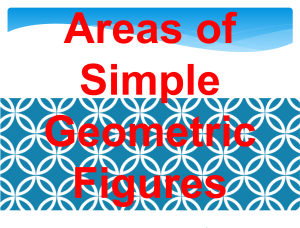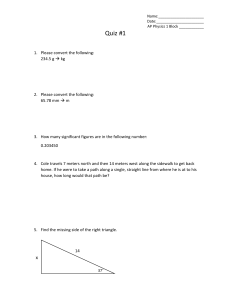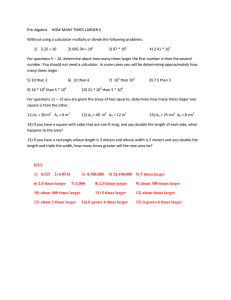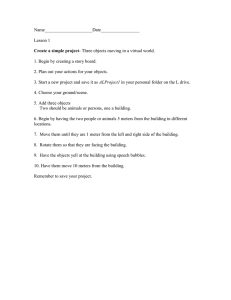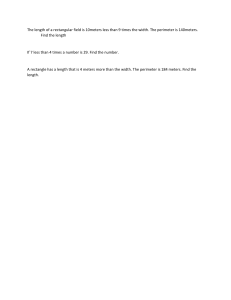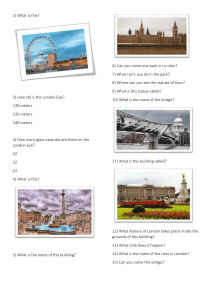DLL MATH-4 Q4 W2 Solving-Routine-and-Non-routine-Problems-Involving-reas-of-Plane-Figure
advertisement
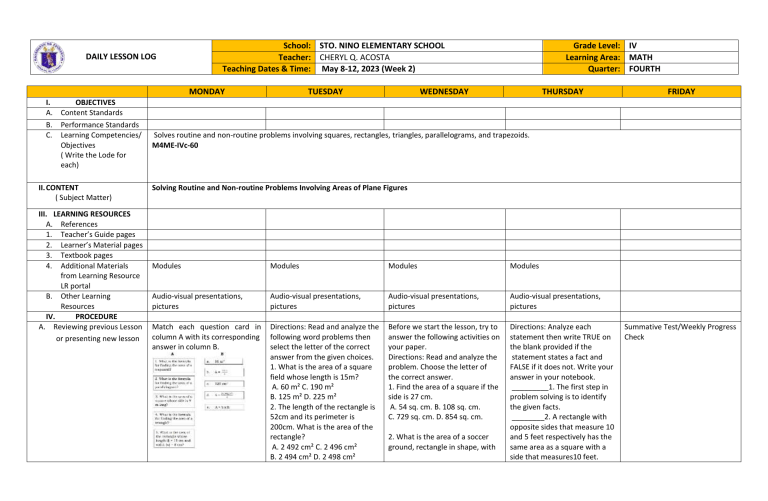
DAILY LESSON LOG School: STO. NINO ELEMENTARY SCHOOL Teacher: CHERYL Q. ACOSTA Teaching Dates & Time: May 8-12, 2023 (Week 2) MONDAY I. OBJECTIVES A. Content Standards B. Performance Standards C. Learning Competencies/ Objectives ( Write the Lode for each) II. CONTENT ( Subject Matter) III. LEARNING RESOURCES A. References 1. Teacher’s Guide pages 2. Learner’s Material pages 3. Textbook pages 4. Additional Materials from Learning Resource LR portal B. Other Learning Resources IV. PROCEDURE A. Reviewing previous Lesson or presenting new lesson TUESDAY Grade Level: IV Learning Area: MATH Quarter: FOURTH WEDNESDAY THURSDAY FRIDAY Solves routine and non-routine problems involving squares, rectangles, triangles, parallelograms, and trapezoids. M4ME-IVc-60 Solving Routine and Non-routine Problems Involving Areas of Plane Figures Modules Modules Modules Modules Audio-visual presentations, pictures Audio-visual presentations, pictures Audio-visual presentations, pictures Audio-visual presentations, pictures Match each question card in column A with its corresponding answer in column B. Directions: Read and analyze the following word problems then select the letter of the correct answer from the given choices. 1. What is the area of a square field whose length is 15m? A. 60 m² C. 190 m² B. 125 m² D. 225 m² 2. The length of the rectangle is 52cm and its perimeter is 200cm. What is the area of the rectangle? A. 2 492 cm² C. 2 496 cm² B. 2 494 cm² D. 2 498 cm² Before we start the lesson, try to answer the following activities on your paper. Directions: Read and analyze the problem. Choose the letter of the correct answer. 1. Find the area of a square if the side is 27 cm. A. 54 sq. cm. B. 108 sq. cm. C. 729 sq. cm. D. 854 sq. cm. Directions: Analyze each statement then write TRUE on the blank provided if the statement states a fact and FALSE if it does not. Write your answer in your notebook. _________1. The first step in problem solving is to identify the given facts. ________2. A rectangle with opposite sides that measure 10 and 5 feet respectively has the same area as a square with a side that measures10 feet. 2. What is the area of a soccer ground, rectangle in shape, with Summative Test/Weekly Progress Check 3. Paulo owns a piece of land which is shaped like a parallelogram. If the base of the land is 220m and its height is 150m, what is the area of the land? A. 32,000 m² C. 34,000 m² B. 33,000 m² D. 35,000 m² a length of 100 m and width of 50 m? A. 50 sq. m. B. 100 sq. m. C. 500 sq. m. D. 5 000 sq. m. 3. Find the area of a triangular parcel of land with a base of 10 meters and a height of 6 meters. A. 15 sq. m. B. 30 sq. m. C. 60 sq. m. D. 120 sq. m. B. Establishing a purpose for the lesson In previous lessons, we learned how to obtain the perimeter and area of plane figures. Now we will apply our knowledge and skills on finding the areas of plane figures to solve problems in real-world situations. We can categorize problem solving into two basic types: routine and non-routine. The purposes and the strategies used for solving problems are different for each type. This lesson is a series of activities that will help you learn, understand and value the importance of solving routine and non-routine problems involving squares, rectangles, triangles, parallelograms and trapezoids in our daily lives. C. Presenting examples/ instances of the new lesson. Read and analyze the problem. Go around inside your classroom and identify objects with the following figures on the table. Write the names of the actual objects you found inside your classroom. Measure the dimensions of each object then find its area. Read the problem below. Precious gave a square carpet to her mother on her birthday. Her mother put the carpet in their sala. The length of a side of the carpet is 100 cm. What is the area of the square carpet? What character trait does Precious possess? Can you give also your mother a gift on her birthday? How will you solve for the answer to the problem? You can solve the problem using the 4-step plan. Carlos wants to cover their backyard with Bermuda grass to prevent soil erosion and preserve the topsoil. The backyard is in the shape of a parallelogram with a base of 11 meters and a height of 9 meters. How many square meters of Bermuda grass are needed to cover the backyard? _________3. The formula in finding the area of a triangle is (b × h). 2 ________4. Two congruent triangles have equal measurements. ________5. In solving for the area of polygons the answer is in square units. Suppose you want to beautify your house and you need tiles to make your floor look elegant, how are you going to estimate the number of tiles to be used? So, the first thing you do is apply your knowledge in solving for the floor area of the house to determine the total number of tiles needed to cover your floor. Now, you know that in everyday life, mathematical skills, especially problemsolving skills is very essential. Without it, the world around will be an ugly place to look at. DIRECTIONS: Match the figures in column A with its corresponding formula in Column B. Write the letter of the correct answer in your notebook. 1. Understand *What is asked for in the problem? The area of the square carpet *What facts are given? 100 cm 2. Plan *How will you solve the problem? By finding the area of a square 3. Solve *What is the formula to solve the problem? A = S x S *How is the solution done? A = 100 cm x 100 cm = 1000 sq. cm. 4. Check and Look Back *What is the answer to the problem? The area of the square carpet is 1000 sq. cm. Area of square = side x side Note: Express the area in sq. cm. (cm2) or sq. m. (m2) D. Discussing new concepts and practicing new skills. #1 The problem given is an example of a routine problem. To solve it, we use the 4-step plan. Shapes make the world a beautiful place to live in. There are objects around us resembling those shapes- rectangle, square, parallelogram, trapezoid and triangle- or a combination of these shapes. In this task, you need to show which of the two figures has a greater area: a triangle with the base of 12 m and a height of 6 m or a trapezoid with bases of 12m and 6m and a height of 4? Draw these figures indicating the given dimensions. Show your computations. A. Understand Know what is asked for in the problem. The area of the lot. Problem # 1 The floor area of your house measures 8 meters by 10 meters. If your mother decides to buy a floor mat how many meters will she buy to cover your floor? Find the necessary information. The given facts are: 20 meters and 8 meters B. Plan Determine the operation to be used. Multiplication Write the number sentence. 20m x 8m = n E. Discussing new concepts and practicing new skills #2. C. Solve Solve using the operation. A=bxh = 20m x 8 m = 160 m² D. Check and Look Back See if your answer makes sense. State the complete answer. The total area of the lot is 160 m². Do the same for problem number 2 using the formula in finding the area of a triangle, that is, A= ½ bh, which means ½ of the product of the base and the height. A= ½bh = ½ (24m x 12m) = ½( 288 m² ) = 144 m² Problem #2 A triangular landscape has a base of 24 meters and height of 12 meters. Find its area. Read the problem below and study the 4-step plan in solving the problem. F. Developing Mastery (Lead to Formative Assessment 3) Solve the word problems and complete the statement. Complete the table. Use the formula in finding the area of a triangle. Directions: Read and solve the problem. Use the 4-step plan. 1. An envelope is 25 cm. long and 40 cm. wide. What is the area of the envelope’s surface? a. Understand: What is asked for in the problem? What facts are given? b. Plan: How will you solve the problem? c. Solve: What is the formula to solve the problem? How is the solution done? d. Check and Look back: What is the answer to the problem? 2. Josephine bought a handkerchief, in the shape of a square. The length of the side is 25 m. What is the area of the handkerchief? a. What is asked for in the problem? _____ What facts are given? ______ b. How will you solve the problem? ____ c. What is the formula to solve the problem? __________ How is the solution done? ____ d. What is the answer to the problem? ______ DIRECTIONS: Read the following problems and answer the questions that follow in your notebook. 1. The Grade Four pupils have a garden in the shape of a trapezoid. One side is 20 m long while the other side is 18 m long. The distance between the sides is 25 m. What is the area of the garden? What is asked? What are the given facts? What is the formula? What is the number sentence? What is the answer? 2. A garden in the shape of a parallelogram has a base of 16m long and a height of 10 m. What is its area? What is asked? What are the given facts? What is the formula? What is the number sentence? What is the answer? Complete the table. Read and solve each problem. Use the 4-step plan. Write your answer on your paper. 1. A sailboat has a triangular sail with a height of 40 cm. If the base of the sail is 18 cm, what is the area? 2. A garden inside a park has a shape of trapezoid. Its bases Analyze the given situations then answer the questions that follow in your notebook. a. The problem is asking for __________ b. The given facts are _____________________ c. The formula to solve the problem is _________ d. The solution is _____________________ e. The complete answer is _______ G. Finding practical application of concepts and skills in daily living a. The problem is asking for __________ b. The given facts are _____________________ c. The formula to solve the problem is _________ d. The solution is _____________________ e. The complete answer is _______ Illustrate/draw on a paper and solve. 3. The square is formed by three identical rectangles. The perimeter of each rectangle 32 cm. What is the area of the square? Shapes make our lives meaningful. We are surrounded with objects which are shaped like squares, rectangles, triangles, parallelograms and trapezoids or a combination of these shapes. Show which of the two figures in the situations below has a greater area. 1. What is given in the problem? 2. What is the formula in finding the area of the garden? 3. What is the area of the garden? a. A triangle with a base of 12 m and a height of 6 m b. A trapezoid with bases of 12 m and 6 m, and a height of 4 m Illustrate the figures, indicate the given dimensions, and show your solution. H. Making Generalizations and Abstraction about the Lesson. I. Evaluating Learning To solve routine word problems involving areas of plane figures, we can follow the 4-step plan: 1. Understand the problem. a. Know what is asked. b. Know what the given facts/data are. 2. Plan a. Draw or illustrate the diagram to visualize the problem, if necessary. b. Use the formula. 3. Solve a. Write the complete solution. b. Label your answer. 4. Check and Look back a. Review and check your answer. Non-routine problems may be solved by drawing a picture or making an illustration, using a number line, making a table, or some other problem-solving strategies. Solve the following word problems. Choose the letter of the correct answer. 1. Nestor prepared a rectangular seedbed measuring 6 m long and 4 m wide. What is the area of the seedbed? a. 28 m2 b. 24 m2 c. 25 m2 d. 30m2 are 14 meters and 20 meters. The perpendicular distance between these bases is 16 meters. What is the area of the garden? 4. What is asked in the problem? 5. What is the number sentence? In finding the area of a Triangle, Square, Rectangle, Trapezoid and Parallelogram, we use the following formula; 1. Triangle: A = ½ b x h 2. Rectangle : A = l x w 3. Trapezoid: A = ( b1 + b2) h2 4. Square : A = b x h 5. Parallelogram: A = b x h To solve problems involving squares, rectangles, triangles, parallelograms, and trapezoids, use the 4-step plan: Understand, Plan, Solve and Check. Solve for the answer by following the different formulas for the area of a square, a rectangle, a triangle, a parallelogram, and a trapezoid. Express the area in sq. cm. (cm2) or sq. m. (m2). We use the 4-step plan in solving problems involving squares, rectangles, triangles, parallelograms and trapezoids. The steps are Understanding, Plan, Solve and Check and Lookback. Draw the figure and indicate the given dimensions. Solve the problem. 1. The living room of Mr. Mendoza’s house is in the shape of a trapezoid with one of the parallel sides 4m long and the other 6m long. The Directions: Read and solve each problem. Follow the 4-step plan. 1. Michael made a square table for his EPP project. The length of the side of the table is 60cm. What is the area? A. Understand B. Plan C. Solve Read, analyze, and solve to find the area following the steps in solving word problems. Write the answer in your notebook. 1. A square carpet, one side of which is 5m. 2. A piece of rectangular land is 110 m long and 73 m wide. 3. A classroom 9 m by 9 m. 2. Rosemarie is making a tablecloth for her square table. If one side of the table is 4 m long, what is the area of the top of the table? a. 16 m2 b. 18 m2 c. 15 m2 d. 17 m2 3. Aunt Susan placed a study table with a triangular top in her library. The top of the table has the following dimensions: its base is 60 cm, and its height is 20 cm. What is the area of the top of the table? a. 650 cm2 b. 600 cm2 c. 700 cm2 d. 610 cm2 4. A decorative pillow is in the shape of a trapezoid. Its upper and lower bases measure 28 cm and 20 cm, respectively. Its height is 10 cm. What is the area of the front surface of the pillow? a. 220 cm2 b. 230 cm2 c. 240 cm2 d. 250 cm2 5. The playground is parallelogram in shape. It has a base of 10 m and a height of 17 m. What is its area? a. 190 m2 b. 180 m2 c. 175 m2 d. 170 m2 J. Additional Activities for Application or Remediation V. REMARKS VI. REFLECTION A. No. of learners earned 80%in the evaluation. perpendicular distance between these sides is 5m. What is the floor area of the living room? 2. Lots in a newly opened subdivision in Barangay Paayas cost Php3,500 per square meter. What is the biggest possible rectangular lot the Ramos family can buy if they have Php400,000? What will be its length and width? Draw or sketch the lot and indicate its length and width. D. Check and Look Back 2. Kharina bought a box for her gift, the length of the side is 35 cm. What is the area of the square box? A. Understand B. Plan C. Solve D. Check and Look Back 3. A rectangular banner has a length of 9 meters and a width of 6 meters. What is the area? A. Understand B. Plan C. Solve D. Check and Look Back 4. Ronn’s kitchen is 9 meters long and 5 meters wide. What is the area of the floor area of the kitchen? A. Understand B. Plan C. Solve D. Check and Look Back 5. Minda needs to order a shade for a triangular-shaped window that has a base of 8 feet and height of 5 feet. What is the area of the shade? A. Understand B. Plan C. Solve D. Check and Look Back 4. A window 4 feet by 2 feet. 5. A trapezoid-shaped piece of wood which bases measure 128 m, 92 m and its height is 40 m. B. No. of learners who required additional activities for remediation who scored below 80% C. Did the remedial lesson work? No. of learners who have caught up with the lesson. D. No. of learner who continue to require remediation E. Which of my teaching strategies worked well? Why did these work? F. What difficulties did I encounter which my principal or supervisor can help me solve? G. What innovation or localized materials did I used/discover which I wish to share with other teachers? Prepared by: Checked by: CHERYL Q. ACOSTA Teacher II EVELYN B. SANTOSS ESHT-III
